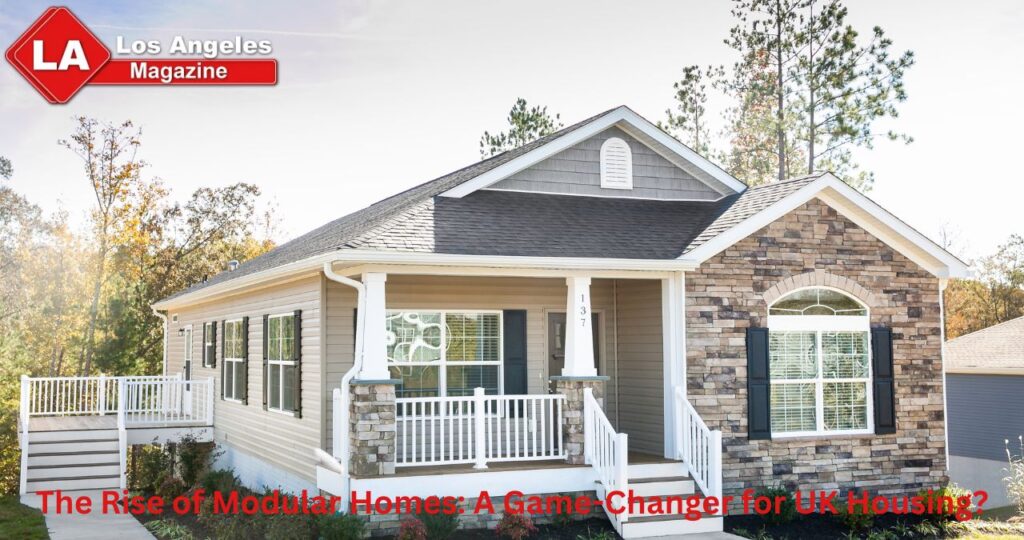The UK housing market continues to face significant challenges in 2025, with affordability issues, supply shortages, and sustainability concerns at the forefront of industry discussions. Amidst these challenges, modular housing has emerged as a potential solution gaining serious attention from developers, policy makers, and homebuyers alike. For estate agents in Bristol and across the UK, understanding this growing sector has become increasingly important when advising clients on future-focused property options.
What Are Modular Homes?
Modular homes (sometimes called prefabricated or precision-built homes) are constructed in sections within factory settings before being transported to their final location for assembly. Unlike traditional construction methods where most building work occurs on-site, modular construction involves manufacturing up to 90% of the structure in controlled factory environments.
The finished modules are transported to the building site where they are assembled on prepared foundations, often in a matter of days rather than the months typically required for conventional builds.
The Growing Appeal of Modular Construction
The appeal of modular housing has grown substantially in recent years, driven by several compelling advantages:
Speed of Delivery
Perhaps the most significant advantage is the dramatically reduced construction time. While traditional builds typically take 6-12 months or longer, modular homes can be manufactured and installed within 10-12 weeks from order to completion. This efficiency addresses the urgent need to increase housing supply quickly.
Quality and Consistency
Factory production allows for precision engineering and quality control that’s difficult to achieve on conventional building sites. Controlled environments eliminate weather-related delays and quality issues, leading to consistent results and fewer defects requiring remediation.
Energy Efficiency
Modern modular homes are designed with sustainability in mind, featuring high-performance insulation, airtight construction, and energy-efficient systems as standard. Many modular housing factories can achieve levels of thermal efficiency that exceed building regulations with minimal additional cost.
Cost Predictability
While not necessarily cheaper than traditional construction in all cases, modular building offers greater cost certainty. Factory production minimises the risk of budget overruns caused by weather delays, site complications, or labour shortages.
Reduced Environmental Impact
The controlled factory environment significantly reduces material waste—typically by 30-40% compared to traditional construction. The precision of factory processes means materials can be ordered exactly as needed with minimal surplus.
Market Growth and Adoption
Bristol has been among the UK cities embracing modular housing solutions, with several notable developments using precision-built methods. Estate agents in Bristol report increasing interest from both buyers and investors in these properties, particularly those seeking energy-efficient homes with lower running costs.
The UK government has also shown support for modular construction as part of its strategy to address housing shortages, with Homes England actively investing in modular housing manufacturers and developments. This institutional backing has helped legitimise the sector and increase consumer confidence.
The Changing Perception of Modular Homes
For many years, prefabricated housing in the UK carried negative associations, linked to the post-war emergency housing that was hastily constructed and often of poor quality. However, modern modular homes bear little resemblance to these earlier iterations.
Today’s modular homes feature contemporary designs, high-quality finishes, and customisation options that can rival or exceed traditional builds. This evolution has helped shift perceptions, with modular now increasingly seen as innovative rather than inferior.
Challenges and Limitations
Despite the growing enthusiasm, several challenges remain:
Financing Hurdles
Some mortgage lenders remain cautious about modular construction, though this is changing as more financial institutions develop specific products for modern methods of construction. Working with experienced estate agents in Bristol and other cities who understand which lenders are modular-friendly has become important for prospective buyers.
Scalability Issues
While the modular sector is growing, it still lacks the scale needed to make a significant dent in the UK’s housing shortage. Major investment in manufacturing facilities is required to increase capacity to the levels needed.
Land Availability
The efficiency of modular construction is most apparent on sites that allow straightforward access for large components. Complex urban infill sites can present logistical challenges that reduce some of the advantages.
Design Flexibility
Though design options have expanded dramatically, there remain some constraints on architectural expression compared to traditional construction methods. However, these limitations continue to diminish as the technology evolves.
The Market Outlook
For property investors and homebuyers, modular housing presents some interesting opportunities:
Investment Potential
Early adopters of quality modular homes may benefit from value appreciation as wider acceptance grows and energy efficiency becomes increasingly important in property valuation.
Reduced Running Costs
The superior energy performance of well-built modular homes translates to significantly lower energy bills—an increasingly important consideration for homebuyers as energy costs remain high.
Future-Proofed Properties
With building regulations continuing to tighten around energy performance, modular homes built to high sustainability standards may require fewer costly retrofits in future years.
Conclusion: A Complementary Solution
Rather than replacing traditional construction entirely, modular housing is establishing itself as a valuable complementary approach that can help address specific challenges in the UK housing market. Its strengths in speed, quality control, and energy efficiency make it particularly well-suited to certain segments of the market.
For estate agents in Bristol and across the UK, staying informed about developments in modular housing has become essential. As consumer interest grows and more developments come to market, the ability to accurately advise clients on the benefits, limitations, and investment potential of modular homes will be an increasingly valuable skill.
While modular construction may not be the singular solution to the UK’s housing challenges, it represents an important innovation in the toolkit available to address them. As the sector continues to mature and scale, its impact on how we build, buy, and value homes is likely to grow substantially in the coming years.



